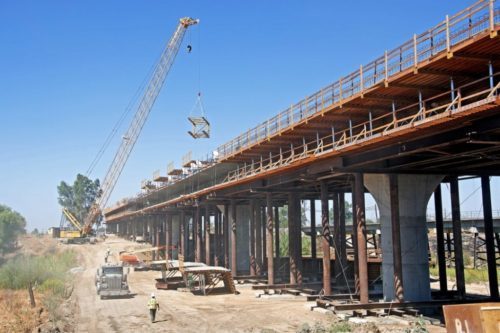Two new headaches for California high-speed rail project

The California High-Speed Rail Authority – the agency in charge of building the state’s bullet train system – has already faced a tough year, with Gov. Gavin Newsom signaling in February that he’s not confident the full system can ever be built. But now the rail authority has two new public relations headaches on its hands.
In the Central Valley, farmers were already upset over state use of eminent domain to seize their property for construction of the project’s first segment – a 110-mile route from Bakersfield to Merced projected to cost $12.2 billion. But a recent report in the Los Angeles Times documented how slow the rail authority was in paying for seized land and in refunding farmers for the cost of the train project’s effects on their businesses.
The Times’ story focused on a kiwi farmer who lost 70 acres of land to the project more than a year ago and who since has gone unpaid for $250,000 incurred in “relocating wells, removing trees, building a road and other expenses.” It also noted farmers who had been owed $1.9 million and $630,000 for three years, and two others owed $500,000 and $150,000, though for shorter periods of time.
State officials questioned by the Times had no explanation for the delays beyond saying the project was complex in its legal and engineering challenges.
A follow-up story by Fox News emphasized why the delayed payments are particularly upsetting to many Central Valley residents. Not only is there a chance the initial segment between Bakersfield and Merced will never be completed because the state doesn’t have enough funds, there is a good chance that even if the segment is finished, some of the property that has been seized won’t be used for the project. That’s because even now – more than five years after the administration of Gov. Jerry Brown decided to start the bullet train’s construction in the Central Valley – authority officials still haven’t agreed on the exact details of the final route.
“The property owners are very frustrated that the High-Speed Rail Authority [doesn’t] seem to know what they actually need,” Sacramento attorney Mark Wasser said. “We have farmers who the authority has come back four times to change where they want to take.” Wasser has more than 70 clients affected by the rail authority’s Central Valley project.
Audit warnings validated by ethics probe
Meanwhile, state audits which have long warned that it is problematic for the rail authority to rely so heavily on outside consultants have been vindicated with what appears to be evidence of a conflict-of-interest scandal.
Recently, the authority’s deputy chief operating officer – Roy Hill – was suspended pending an investigation by the state Fair Political Practices Commission. Hill is a top executive with the WSP consulting firm employed by the authority. Evidence suggests that Hill approved a $51 million increase in a bullet-train contract held by the Spanish firm Dragados despite his apparent ownership of more than $100,000 in stock in Jacobs Engineering, a multibillion-dollar multinational corporation that is providing key services to Dragados on the California project.
The FPPC approved the request of Assemblyman Jim Patterson, R-Fresno, to investigate Hill, his actions and his personal economic interests.
“This is such a deep conflict that it calls into question whether the entire High-Speed Rail Authority and the contractors they have put together are involved in a massive corruption,” Patterson told Fresno TV station KMJ.
The rail authority says it will cooperate with the FPPC probe.
Hill has not yet commented publicly on the matter.
Chris Reed
Chris Reed is a regular contributor to Cal Watchdog. Reed is an editorial writer for U-T San Diego. Before joining the U-T in July 2005, he was the opinion-page columns editor and wrote the featured weekly Unspin column for The Orange County Register. Reed was on the national board of the Association of Opinion Page Editors from 2003-2005. From 2000 to 2005, Reed made more than 100 appearances as a featured news analyst on Los Angeles-area National Public Radio affiliate KPCC-FM. From 1990 to 1998, Reed was an editor, metro columnist and film critic at the Inland Valley Daily Bulletin in Ontario. Reed has a political science degree from the University of Hawaii (Hilo campus), where he edited the student newspaper, the Vulcan News, his senior year. He is on Twitter: @chrisreed99.
Related Articles
House legislation targets environmental laws
Last week, House Republicans introduced legislation to revise water policies in California and the rest of the West Coast, improving
Will MWD try — again — to sabotage client seeking new water supplies?
I’ve been a journalist in Socal since 1990, and I’ve never seen a story about government behavior as strange as
Study: Caesar and Robin Hood enjoyed warmer climate
Toga! Toga! Toga! Ever wonder why the ancient Romans built an “empire without end,” to quote Virgil, while walking around




